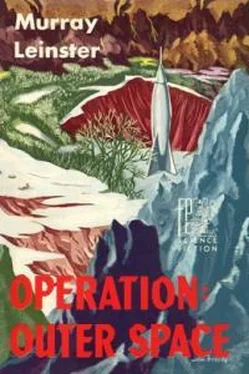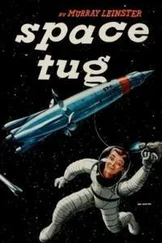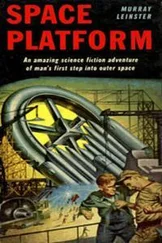Babs Deane did not take dozy–pills either, but Cochrane knew better than to be more than remotely friendly with her outside of office hours. He did not want to give her any excuse to tell him anything for his own good. So he spoke pleasantly and kept company only with his own thoughts. But he did notice that she looked rapt and starry–eyed even through the long and dreary hours of free flight. She was mentally tracking the moonship through the void. She'd know when the continents of Earth were plain to see, and the tints of vegetation on the two hemispheres—northern and southern—and she'd know when Earth's ice–caps could be seen, and why.
The stewardess was not too much of a diversion. She was brisk and calm and soothing, but she became a trifle reluctant to draw too near the chairs in which her passengers rode. Presently Cochrane made deductions and maliciously devised a television commercial. In it, a moon–rocket stewardess, in uniform and looking fresh and charming, would say sweetly that she went without bathing for days at a time on moon–trips, and did not offend because she used whoosit's antistinkum. And then he thought pleasurably of the heads that would roll did such a commercial actually get on the air.
But he didn't make plans for the production–job he'd been sent to the moon to do. Psychiatry was specialized, these days, as physical medicine had been before it. An extremely expensive diagnostician had been sent to the moon to tap Dabney's reflexes, and he'd gravely diagnosed frustration and suggested young Dr. Holden for the curative treatment. Frustration was the typical neurosis of the rich, anyhow, and Bill Holden had specialized in its cure. His main reliance was on the making of a dramatic production centering about his patient, which was expensive enough and effective enough to have made him a quick reputation. But he couldn't tell Cochrane what was required of him. Not yet. He knew the disease but not the case. He'd have to see and know Dabney before he could make use of the extra–special production–crew his patient's father–in–law had provided from the staff of Kursten, Kasten, Hopkins and Fallowe.
Ninety–some hours after blast–off from the space platform, the rocket–ship turned end for end and began to blast to kill its velocity toward the moon. It began at half–gravity—the red glowing sign gave warning of it—and rose to one gravity and then to two. After days of no–weight, two gravities was punishing.
Cochrane thought to look at Babs. She was rapt, lost in picturings of what must be outside the ship, which she could not see. She'd be imagining what the television screens had shown often enough, from film–tapes. The great pock marked face of Luna, with its ring–mountains in incredible numbers and complexity, and the vast open "seas" which were solidified oceans of lava, would be clear to her mind's eye. She would be imagining the gradual changes of the moon's face with nearness, when the colorings appear. From a distance all the moon seems tan or sandy in tint. When one comes closer, there are tawny reds and slate–colors in the mountain–cliffs, and even blues and yellows, and everywhere there is the ashy, whitish–tan color of the moondust.
Glancing at her, absorbed in her satisfaction, Cochrane suspected that with only half an excuse she would explain to him how the several hundreds of degrees difference in the surface–temperature of the moon between midnight and noon made rocks split and re–split and fracture so that stuff as fine as talcum powder covered every space not too sharply tilted for it to rest on.
The feeling of deceleration increased. For part of a second they had the sensation of three gravities.
Then there was a curious, yielding jar—really very slight—and then the feeling of excess weight ended altogether. But not the feeling of weight. They still had weight. It was constant. It was steady. But it was very slight.
They were on the moon, but Cochrane felt no elation. In the tedious hours from the space platform he'd thought too much. He was actually aware of the humiliations and frustrations most men had to conceal from themselves because they couldn't afford expensive psychiatric treatments. Frustration was the disease of all humanity, these days. And there was nothing that could be done about it. Nothing! It simply wasn't possible to rebel, and rebellion is the process by which humiliation and frustration is cured. But one could not rebel against the plain fact that Earth had more people on it than one planet could support.
Merely arriving at the moon did not seem an especially useful achievement, either to Cochrane or to humanity at large.
Things looked bad.
Cochrane stood when the stewardess' voice authorized the action. With sardonic docility he unfastened his safety–belt and stepped out into the spiral, descending aisle. It seemed strange to have weight again, even as little as this. Cochrane weighed, on the moon, just one–sixth of what he would weigh on Earth. Here he would tip a spring–scale at just about twenty–seven pounds. By flexing his toes, he could jump. Absurdly, he did. And he rose very slowly, and hovered—feeling singularly foolish—and descended with a vast deliberation. He landed on the ramp again feeling absurd indeed. He saw Babs grinning at him.
"I think," said Cochrane, "I'll have to take up toe–dancing."
She laughed. Then there were clankings, and something fastened itself outside, and after a moment the entrance–door of the moonship opened.
They went down the ramp to board the moon–jeep, holding onto the hand–rail and helping each other. The tourist giggled foolishly. They went out the thick doorway and found themselves in an enclosure very much like the interior of a rather small submarine. But it did have shielded windows—ports—and Babs instantly pulled herself into a seat beside one and feasted her eyes. She saw the jagged peaks nearby and the crenelated ring–mountain wall, miles off to one side, and the smooth frozen lava of the "sea." Across that dusty surface the horizon was remarkably near, and Cochrane remembered vaguely that the moon was only one–fourth the size of Earth, so its horizon would naturally be nearer. He glanced at the stars that shone even through the glass that denatured the sunshine. And then he looked for Holden.
The psychiatrist looked puffy and sleepy and haggard and disheveled. When a person does have space–sickness, even a little weight relieves the symptoms, but the consequences last for days.
"Don't worry!" he said sourly when he saw Cochrane's eyes upon him. "I won't waste any time! I'll find my man and get to work at once. Just let me get back to Earth…."
There were more clankings—the jeep–bus sealing off from the rocket. Then the vehicle stirred. The landscape outside began to move.
They saw Lunar City as they approached it. It was five giant dust–heaps, from five hundred–odd feet in height down to three. There were airlocks at their bases and dust–covered tunnels connecting them, and radar–bowls about their sides. But they were dust–heaps. Which was completely reasonable. There is no air on the moon. By day the sun shines down with absolute ferocity. It heats everything as with a furnace–flame. At night all heat radiates away to empty space, and the ground–temperature drops well below that of liquid air. So Lunar City was a group of domes which were essentially half–balloons—hemispheres of plastic brought from Earth and inflated and covered with dust. With airlocks to permit entrance and exit, they were inhabitable. They needed no framework to support them because there were no stormwinds or earthquakes to put stresses on them. They needed neither heating nor cooling equipment. They were buried under forty feet of moon–dust, with vacuum between the dust–grains. Lunar City was not beautiful, but human beings could live in it.
Читать дальше






